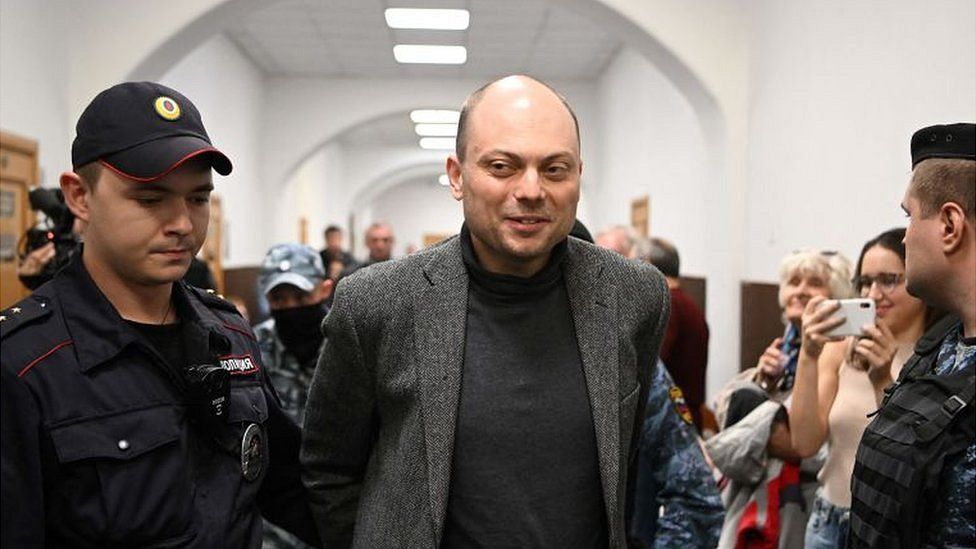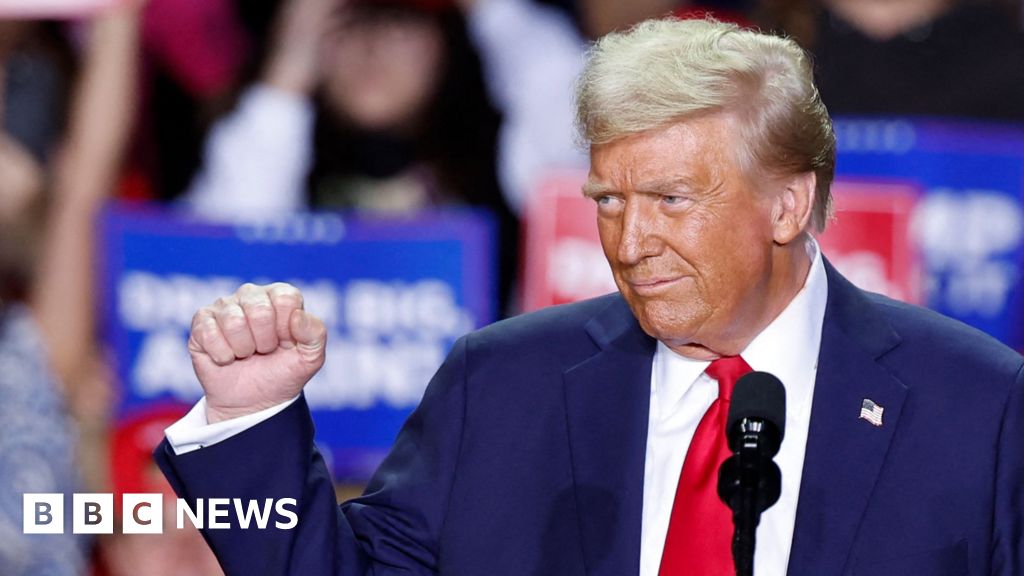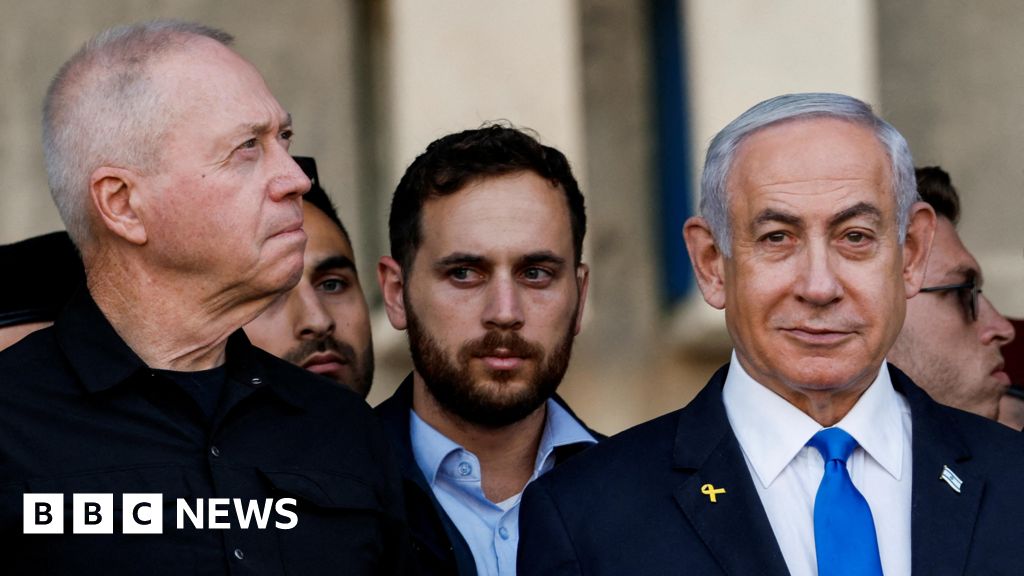ARTICLE AD BOX
 Image source, Getty Images
Image source, Getty Images
Vladimir Kara-Murza told the court he believed Russia could one day be truthful, democratic and free
By Sarah Rainsford
BBC Eastern Europe correspondent
Evgenia Kara-Murza has been surviving on autopilot ever since her husband, Vladimir, was convicted of treason for his public criticism of President Vladimir Putin and Russia's war on Ukraine.
On Monday, the Russian opposition politician was sentenced to 25 years in a high security prison and his wife has no idea when she or the couple's three children will ever see him again.
She's been so outspoken herself, she can't risk travelling to Russia in case she too ends up in jail.
"I'm afraid they might detain me to put pressure on Vladimir, and I can't afford him losing my voice as well, or leaving our kids without both parents," Evgenia explained over the phone from the US, where the family live for safety.
She says she's "heartbroken" - she hasn't even been allowed to speak to her husband since his arrest over a year ago - but for now she's numbed herself against the enormity of the verdict to focus on rallying international support.
Vladimir Kara-Murza is also a British citizen, but whilst the US, Canada and Latvia moved quickly to sanction Russian officials they hold responsible for the activist's plight, his own government has been left playing catch-up.
On Friday, the UK Foreign Office announced sanctions against one judge and two investigators involved in Kara-Murza's trial, as well as two Federal Security Service (FSB) agents suspected of links to his sudden, critical illness in 2015 and 2017 caused by a toxin that has never been identified.
Evgenia welcomed that move, but it's well short of the more than 30 names she put forward.
"It only saddens me that it took a year of unlawful detention, a horrific sentence of 25 years in a strict regime and a very concerning deterioration of my husband's health for the British government to move to a somewhat stronger response," she told me, shortly after the announcement.
Vladimir Kara-Murza has again been losing feeling in both his feet and his left hand - symptoms which first appeared after his poisoning. A prison doctor has diagnosed polyneuropathy, which affects the nerves.
"For years, he was able to keep those symptoms at bay with regular exercise, but now they've returned and seem to be spreading," Evgenia says. "I believe the Russian authorities are using it as torture; slowly killing a person."
A college profile photo of a young Vladimir Kara-Murza - he later graduated from Cambridge and returned to Moscow in 2003
Vladimir Kara-Murza was born in Moscow in 1981 and moved to the UK as a teenager when his mother married a Yorkshireman.
He went to public school in Harrow then read history at Cambridge. He has a taste for tweed jackets and smoking pipes, and in one of the letters he sent me from prison, he listed Yes, Minister! and Fawlty Towers among his favourite TV shows.
Kara-Murza is as eloquent in English as in Russian, and uses both to condemn how President Putin has systematically crushed the democratic values that the activist holds so dear.
But his political ambitions have always focused firmly on his homeland. In his application to study at Cambridge, which I was shown, a teenage Kara-Murza described his greatest aspiration as "leading the country in which I was born".
He grew up during Russia's short-lived but intense burst of democratic chaos as the Soviet Union fell apart.
At 13, he even set up his own children's political party and tried to get it registered with the Justice Ministry in Moscow, which refused.
"Even for those democratic days, this was too much," he joked in one letter to me from his cell, with a grinning emoji.
His first significant political memory is of the failed coup in 1991, when hardliners tried to topple Mikhail Gorbachev and reverse his liberalising reforms. Kara-Murza's father joined the giant crowd that built barricades around the parliament then, and the activist describes those as "the best and freest days" in Russia's modern history.
By the time he graduated and returned to Moscow in 2003, President Putin was tightening the political screws.
That autumn, aged 22, Kara-Murza ran for a seat in the Russian parliament and lost. Genuine opposition candidates were still allowed on the ballot in those days, but the city authorities would extinguish the lights on his campaign billboards, and when he appeared in a TV debate, his microphone was cut.
Two decades on, he still refuses to be silenced.
Image source, EPA
Image caption,Kara-Murza delivered an address in the Moscow court from a cage of bulletproof glass
His trial for treason was held behind closed doors although no state secrets were involved. Even the official charge sheet makes it clear that he's being punished for challenging the Kremlin: the case is based on public political speeches, made at home and abroad.
So when he gave his final address to the court from a cage of bulletproof glass, the only audience before him was made up of prosecutors, investigators and judges: all cogs in the system that had found the activist guilty the day it ordered his arrest a year earlier.
But the text of his speech was quickly leaked by his supporters who posted it online in a modern-day version of samizdat, the way works of dissident writers were copied and shared in Soviet times.
It was short, under four minutes, if you read it aloud. But Kara-Murza would have weighed every word, aware that it was the most important address of his political life.
It delivers his own, damning judgement of President Putin's rule. He calls Russia's president a "dictator" and "usurper" and condemns his "criminal war" on Ukraine. It's exactly the kind of talk that got him arrested.
Kara-Murza also recalls his great friend and political inspiration, Boris Nemtsov. Once a prominent reformer, Nemtsov was shot and killed in 2015, just metres from the Kremlin. Kara-Murza himself first fell critically ill a few months later.
Kara-Murza (right) seen alongside former Russian opposition leader Boris Nemtsov
After meeting in England, the two became close allies and friends, later collaborating on a project that was a huge irritant to Russia's most rich and powerful.
They lobbied hard in the US for legislation known as the Magnitsky Act, allowing for punitive sanctions against Russian human rights violators. The bill took aim at a corrupt elite enjoying private schools, bank accounts and extravagant property in the West whilst trampling on basic freedoms at home.
A series of European countries soon passed their own versions of the law and Evgenia Kara-Murza believes the treatment of her husband is payback.
"I think it's for a combination of things, including how he continues being unequivocal in his opposition to the regime and its crimes," she says. "But 35 or 36 countries have the Magnitsky legislation now, which shows that Vladimir is very effective in his work. It's why they hate him so much."
Sergei Podoprigorov, the chief judge who sentenced Kara-Murza to prison, was one of the earliest targets of the list.
But Kara-Murza's "Last Word", his speech to a small, wood-panelled court in Moscow, was more than a denunciation of tyranny and a terrible war. It also conveyed his own dream, of another Russia. A country he still believes can one day be truthful, democratic and free.
"That day will come as surely as spring comes after even the iciest of winters," he insisted from the dock, addressing anyone who might hear, against all the odds.
It's that vision that has carried Vladimir Kara-Murza this far. It's now the faith he must cling to in the solitude of his prison cell.

 1 year ago
17
1 year ago
17








 English (US)
English (US)